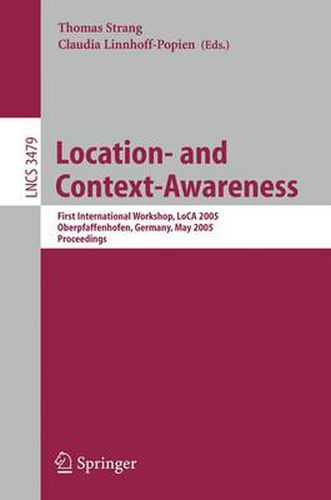Readings Newsletter
Become a Readings Member to make your shopping experience even easier.
Sign in or sign up for free!
You’re not far away from qualifying for FREE standard shipping within Australia
You’ve qualified for FREE standard shipping within Australia
The cart is loading…






This title is printed to order. This book may have been self-published. If so, we cannot guarantee the quality of the content. In the main most books will have gone through the editing process however some may not. We therefore suggest that you be aware of this before ordering this book. If in doubt check either the author or publisher’s details as we are unable to accept any returns unless they are faulty. Please contact us if you have any questions.
Context-awareness is one of the drivers of the ubiquitous computing paradigm. Well-designed context modeling and context retrieval approaches are key p- requisites in any context-aware system. Location is one of the primary aspects of all major context models - together with time, identity and activity. From the technical side, sensing, fusing and distributing location and other context information is as important as providing context-awareness to applications and services in pervasive systems. Thematerialsummarizedinthisvolumewasselectedforthe1stInternational Workshop on Location- and Context-Awareness (LoCA 2005) held in coope- tion with the 3rd International Conference on Pervasive Computing 2005. The workshop was organized by the Institute of Communications and Navigation of the German Aerospace Center (DLR) in Oberpfa?enhofen, and the Mobile and Distributed Systems Group of the University of Munich. During the workshop, novel positioning algorithms and location sensing te- niques were discussed, comprising not only enhancements of singular systems, like positioning in GSM or WLAN, but also hybrid technologies, such as the integration of global satellite systems with inertial positioning. Furthermore, - provements in sensor technology, as well as the integration and fusion of sensors, were addressed both on a theoretical and on an implementation level. Personal and con?dential data, such as location data of users, have p- found implications for personal information privacy. Thus privacy protection, privacy-oriented location-aware systems, and how privacy a?ects the feasibility and usefulness of systems were also addressed in the workshop.
$9.00 standard shipping within Australia
FREE standard shipping within Australia for orders over $100.00
Express & International shipping calculated at checkout
This title is printed to order. This book may have been self-published. If so, we cannot guarantee the quality of the content. In the main most books will have gone through the editing process however some may not. We therefore suggest that you be aware of this before ordering this book. If in doubt check either the author or publisher’s details as we are unable to accept any returns unless they are faulty. Please contact us if you have any questions.
Context-awareness is one of the drivers of the ubiquitous computing paradigm. Well-designed context modeling and context retrieval approaches are key p- requisites in any context-aware system. Location is one of the primary aspects of all major context models - together with time, identity and activity. From the technical side, sensing, fusing and distributing location and other context information is as important as providing context-awareness to applications and services in pervasive systems. Thematerialsummarizedinthisvolumewasselectedforthe1stInternational Workshop on Location- and Context-Awareness (LoCA 2005) held in coope- tion with the 3rd International Conference on Pervasive Computing 2005. The workshop was organized by the Institute of Communications and Navigation of the German Aerospace Center (DLR) in Oberpfa?enhofen, and the Mobile and Distributed Systems Group of the University of Munich. During the workshop, novel positioning algorithms and location sensing te- niques were discussed, comprising not only enhancements of singular systems, like positioning in GSM or WLAN, but also hybrid technologies, such as the integration of global satellite systems with inertial positioning. Furthermore, - provements in sensor technology, as well as the integration and fusion of sensors, were addressed both on a theoretical and on an implementation level. Personal and con?dential data, such as location data of users, have p- found implications for personal information privacy. Thus privacy protection, privacy-oriented location-aware systems, and how privacy a?ects the feasibility and usefulness of systems were also addressed in the workshop.